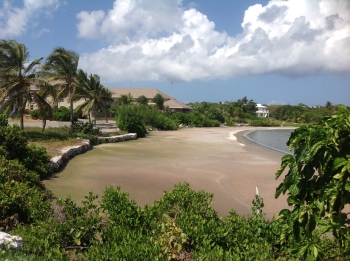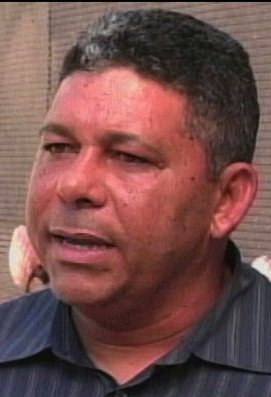Archive for April, 2014

Health workers urged to get healthy
 (CNS): The public health department will be launching a three month workplace wellness programme on Monday, World Health Day, to encourage its own workers at the Health Services Authority (HSA) to ‘Take the Challenge – Be Fit: Stay Healthy'. Each participant is required to keep personal goals which are monitored throughout the programme, as well as a follow-up check one year from now. Given the role staff have at the HSA to help others keep well, Lizzette Yearwood, Chief Executive Officer of the Health Services Authority, said that wellness inthe workplace at the hospital was very important.
(CNS): The public health department will be launching a three month workplace wellness programme on Monday, World Health Day, to encourage its own workers at the Health Services Authority (HSA) to ‘Take the Challenge – Be Fit: Stay Healthy'. Each participant is required to keep personal goals which are monitored throughout the programme, as well as a follow-up check one year from now. Given the role staff have at the HSA to help others keep well, Lizzette Yearwood, Chief Executive Officer of the Health Services Authority, said that wellness inthe workplace at the hospital was very important.
“We strive to provide the best healthcare experience to our patients so it is important to encourage our staff take care of their physical and mental health as well,” she said. “Last year’s Cayman Islands Healthcare Conference theme was focused on the shared approach to workplace wellness, which is a reflection of how important employee wellness is on a day to day basis.”
Yearwood said there were plans to implement many employee health initiatives as an outcome from that conference.
Dr Kiran Kumar, Medical Officer of Health, said he is looking forward to this year’s programme.
“We offer this wellness programme to staff, as well as facilitating it to other government and private organisations and have been doing so since 2006. This three month programme is designed to encourage staff to expand their outlook on wellness and encourage healthy living by eating well, increasing physical activity, reducing stress and building healthier self-esteem,” he added.
The programme offers a range of activities including educational lunch-and-learn sessions as well as group counselling sessions covering topics such as how to best manage stress. It was open to all HSA staff through an open enrollment process and Therese Prehay, Health Promotion Officer, said the response from staff has been positive.
“This programme is very intensive and is designed so participants are more inclined to live a healthy lifestyle even after the programme is completed with an ongoing yearlong maintenance component”, Ms Prehay said. “At the start of the programme each participant has his or her measurements of waist, height, body mass index (BMI), blood pressure and blood work to test cholesterol and blood glucose taken to document their starting point,” she said, adding that there would be prizes for various categories bringing an element of friendly competition to encourage employees.
For more information about this programme, contact Therese Prehay at the Public Health Department, 244-2632.

No PAD for Ironwood
(CNS): Developers of the proposed $360 million development in Frank Sound have said it is unlikely that they will be submitting a Planned Area Development application for this project, despite its size. David Moffitt said he was expecting to submit a planning application sometime this month for another part of the project but it appears the developers will continue submitting applications piecemeal. Despite warnings from the Department of Environment regarding the size of the project and its potential impact on the community and natural resources in an area home to many of Cayman’s endangered endemic species, the authorities will not get to consider this project holistically.
Speaking at a public meeting in North Side last week, Moffitt revealed that alongside a proposed golf course, residential and commercial buildings and a retirement village, all covering several hundred acres, the developers also plan to dredge lakes in the area.
Although Moffitt said the developers would undertake some type of environmental audit, given the mounting ecological threat this development and the accompanying road extension pose, the decision not to submit a planned area development has raised concerns amongst environmental activists.
Sustainable Cayman, a local advocacy group of the environment, said this week in a CNS Viewpoint that the “current impromptu method of development based primarily upon the interests of private investors” would not solve the Caymans' economic problems but it would sacrifice the environment.
Since 2012 the Department of the Environment has been raising its concerns about the proposed project, not because it is trying to stop it but because of the expressed desire to examine the plans in their entirety rather than bit by bit. Given the impact that such a huge new development would have in the area, the DoE has said that all of the wider implications should be considered in context before it is given the green light.
During last week’s public meeting most of the residents of North Side who attended appeared to welcome the project as they seemed to believe it would bring jobs, prosperity and more development in its wake to the district. Only a few residents were concerned about the change it would bring and the obvious destruction of natural critical habitat, the threats to National Trust wetlands, Mastic Trail and Reserve, the Botanic Park and even the local fresh water lens.
Ezzard Miller, the MLA for the district who organised the meeting, which was the first time the developers had spoken to his constituents and allowed them to ask questions, was concerned that the developers would not necessarily be willing to pay North Siders the wages that they should be paid. Despite promises, he was worried that in the end, like many other developers before them, they would seek cheap labour from overseas, leaving locals unemployed. The popular representative was also concerned about what it would do to the district.
“While it might sound good, I am concerned about changing the face of North Side and what a potential influx of 2,000 people into the district might do without the correct supporting infrastructure,” he said. Expressing concerns about the water lens and environmental threats, Miller was, however, not too worried about the developers decision over the PAD. He said the most important thing was that the people of North Side were kept fully informed about the details of the development and involved in it if it went ahead.

CNB closes Edward Street branch with no staff loss
(CNS Business): Cayman National Bank has closed its Edward Street customer service centre but the bank says all 13 staff members will be redeployed elsewhere in the company to manage the redistribution of client business traffic. CNB said in a statement that the lease for the building is expiring this year and the branch no longer serves the firm's strategic objectives, so they decided not to renew the lease. CNB President Ormond A. Williams stated, “In this difficult economic climate where businesses are reducing their staff complement, we have taken the approach to retain, retrain and redeploy our existing staff, which is a true testament of the Cayman National ethos and commitment to the socio-economic development of our community.” Read more on CNS Business
Pond smell could get worse
(CNS): Plans by the owner of the Alexander Hotel on Cayman Brac to dig out part of the adjacent Saltwater Pond in order to get rid of the bad smell could backfire. Not only is there no certainty that excavating one third of the pond will help alleviate the stink but it could actually make things worse, according to Department of Environment Director Gina Ebanks-Petrie. Hotel owner Cleveland Dilbert informed staff earlier this week that he was shutting down the Alexander after Cabinet insisted that he had to produce an environmental impact assessment before they could approve his coastal works application, which is part of a project to turn Saltwater Pond into a marina. However, it appears the hotel will not be closing after all.
"The Alexander Hotel will remain open as we work in partnership to find solutions," Deputy Premier and Minister of Tourism Moses Kirkconnell announced on the PPM Facebook page Wednesday, following “extensive talks” with Dilbert. (Below: the hotel sits next to Saltwater Pond, which emits a strong smell when the water level is low.)

Talking to The Caymanian Compass the same day, Dilbert claimed negotiations with government this week were “successful” and that he had been given authority (though the article was not clear by whom) to begin work on the “basin section” of the pond, pending approval from the Development Control Board.
However, commenting on the article, the DoE director said that several points needed to be clarified.
“Regarding the multiple claims in the article that excavating the pond will address the odour problem, the applicant has provided no evidence that excavating one-third of the pond will fix the smell. What of the remaining two-thirds which will be up-wind of the hotel?” Ebanks-Petrie asked. "To the best of my knowledge, there has been no proper investigation of the hydrology of the pond, the depth and characteristics of the sediments in the pond, or of the geology (for example, will it need to be blasted before it can be dug) in the location in which the Dilberts intend to excavate", she added.
“If the geology permits them to dig to their proposed depth, this will come with its own challenges in terms of maintaining good water quality. Deeper, artificially created ponds generally have poorer water circulation and poorer light penetration, both of which will likely contribute to low dissolved oxygen levels and poor water quality. In addition, by removing the sediments the connection to ground water will likely be enhanced, thus creating the potential for the introduction of excess nutrients through connections with deep wells from septic tanks on the surrounding properties as well as from land-based run-off,” she explained.
“If not approached carefully, and without a full understanding of both the natural pond ecosystem and the exact cause of the smell, excavation could result in making things worse,” Ebanks-Petire warned. “One of the DoE’s long-standing concerns is the detrimental impact on the marine environment resulting from opening this pond system to the sea.”
The DoE director also addressed suggestions in the article that the Dilbert family might not be fully responsible for covering the cost of the environmental impact assessment (EIA).
“Developers pay for EIAs because they have an obligation and a duty to demonstrate, with facts, that what they are proposing will not have irreversible, adverse effects on the environment and society. In this case the developer is proposing to impact public crown-owned resources (the pond belongs to the crown, as does the seabed),” Ebanks-Petrie said. “In our view this creates an even greater imperative for the developer to demonstrate that no harm will be done.”
She also questioned some of the claims made by Dilbert in the article about the marina project.
“Mr Dilbert acknowledges that he is not an environmental expert but claims that ‘after extensive research and consultation on our part, we are very confident that the proposed project, overall, will prove to not pose as a threat,” the DoE director said. “To date, Mr Dilbert has not produced any of this ‘extensive research’ to aid the decision making process. If he has this information, he needs to make it available to the DoE and the government as soon as possible.”
CNS has asked the Dilbert family what extensive research has been done and if any of it is documented and is awaiting a response.
Related article on CNS:
Waterfront clean-up aims to clear out criminals
(CNS): Police from George Town’s neighbourhood unit teamed up with the Recreations, Parks and Cemetery Unit clean-up crew at the capital’s waterfront this week to beautify the area and prevent criminal activity in the vicinity of the Fish Market. The objective behind the clean-up was twofold, Chief Inspector Howell, the District Commander for George Town, said, explaining it would make the area look more attractive, given how essential tourism is to the local economy and also deter criminal activities. She said that this particular area has been known to “harbour undesirables”, who drink booze as well as sell and use drugs there.
The cops and clean-up crew cut down trees and bush to remove the cover for dealers in the wake of contradictory proposals released by the Chamber of Commerce to pedestrianise downtown George Town, which include plans for more vegetation and natural shade.
The police, however, always prefer open areas, where villains and those up to no good have nowhere to hide. As the capital of the islands, the police pointed to the importance of George Town and the need to do all that is necessary to keep the local people and visitors safe on a daily basis.
Howell urged everyone to play their part in securing the reputation of the Cayman Islands by reporting those who may be defacing properties within these areas, loitering or selling and using illegal drugs.
“We cannot be everywhere; therefore, we rely on you, the good citizens of this country, to assist us in policing these Islands,” CI Howell said, as she thanked the Department of Environmental Health for undertaking the project with the police as well as those who donated the paint and other equipment.

Woman sues school after slipping on loose paving
 (CNS): A 56-year-old woman who broke her wrist and twisted her ankle when she slipped on loose paving on the grounds of a George Town school is suing the owners for damages. Viola Powery has filed suit against Triple C School as a result of the fall because she says the pathway on which she fell, where work was being carried out, was very badly lit and there are no warning signs or cones to indicate the hazard of loose paving stones. The incident happened in February 2011 and the woman is claiming medical costs of more than $18,000, plus damages as the court sees fit, interest and costs.
(CNS): A 56-year-old woman who broke her wrist and twisted her ankle when she slipped on loose paving on the grounds of a George Town school is suing the owners for damages. Viola Powery has filed suit against Triple C School as a result of the fall because she says the pathway on which she fell, where work was being carried out, was very badly lit and there are no warning signs or cones to indicate the hazard of loose paving stones. The incident happened in February 2011 and the woman is claiming medical costs of more than $18,000, plus damages as the court sees fit, interest and costs.
Powery states in her claim that at around 7:30pm she was at the school to attend a church function and had to make her way along a dark path. Given what she said was poor lighting and no warning cones or barriers around the area where work was being done on the pavement, she tripped and fell, causing her injuries. Powery claims that her accident was caused by the school’s breach in its duty of care to visitors by not lighting the pathway properly and not alerting people to the pavement hazard as it was under repair.
Although someone from the school had spoken to the woman and apologized to her for the fall and asked for the medical record so he could follow up, Powery said at the time of the request they were not available.
It is not clear in the claim filed in the Grand Court by local attorney Clyde Allen on 26 February if Powery ever supplied the records and what, if any, action the school took after the incident some four years ago.

US created ‘Cuban Twitter’ to stir unrest
 (BBC): The US created a text-message social network designed to foment unrest in Cuba, according to an investigation by the Associated Press news agency. ZunZuneo, dubbed a "Cuban Twitter", had 40,000 subscribers at its height in a country with limited web access. The project reportedly lasted from 2009-12 when the grant money ran out. The US is said to have concealed its links to the network through a series of shell companies and by funnelling messages through other countries. The BBC's Sarah Rainsford in the Cuban capital of Havana says there is a thirst for information on the island, which has no independent media. There has been no official Cuban government reaction to the story.
(BBC): The US created a text-message social network designed to foment unrest in Cuba, according to an investigation by the Associated Press news agency. ZunZuneo, dubbed a "Cuban Twitter", had 40,000 subscribers at its height in a country with limited web access. The project reportedly lasted from 2009-12 when the grant money ran out. The US is said to have concealed its links to the network through a series of shell companies and by funnelling messages through other countries. The BBC's Sarah Rainsford in the Cuban capital of Havana says there is a thirst for information on the island, which has no independent media. There has been no official Cuban government reaction to the story.
The scheme was reportedly operated by the US Agency for International Development (USAID), a federal international development organisation run under the aegis of the Department of State.

Jeffers guilty of killing Ming
(CNS): After another four-and-a-half hours of deliberation, the twelve jurors in the Raziel Jeffers case returned a verdict of guilty on Thursday for the murder of Damion Ming. The judge told Jeffers he believed he was a cruel, calculating cold blooded killer, as he handed down the mandatory life sentence. Thanking the jury for their service, as he noted the stresses on such a case, he told them that he entirely agreed with their verdict. Jeffers is already serving a full life sentence for the murder of Marcus Ebanks in July 2009. Both cases depended heavily on the evidence of the crown's key witness, Jeffers' former girlfriend, who said her lover had confessed his crime to her. Jeffers remained impassive as he stood in the dock and faced the judge before he was sent down.
Ming was gunned down in a yard in Birch Tree Hill Road on the night of 25 March 2010. He was hit twice and was believed to have crawled under the boat to take cover from the shooter where his body was found when the police arrived.
Although there were several people in the yard at the time he was shot there were no eye witnesses to the killer who was believed to have fired around eight shots. One man told police that he saw a man ride away on a bicycle immediately after the shots were fired.
Two months after the murder, Jeffers' former girlfriend went to the police and told UK officers that her ex-lover had confessed to this and other crimes. Her evidence appeared to tie in with the reports from the pathologist, the ballistics experts and the account given about the bike. In addition the crown also presented telephone evidence which too corroborated the account given by the witness as told to her by Jeffers.
Already convicted twice for murder, Jeffers may still face a further trial for a third killing as he has also been charged with the murder of Marcus Duran in what the crown say was a robbery gone wrong in Maliwinas Way, West Bay. Duran was believed to be a local numbers' man who was collecting cash from his clients in the illegal lottery when he was gunned down outside an apartment on 10 March 2010, just two weeks before Ming was killed.

I’m a liar & a thief, says Joey
 (CNS): Joey Ebanks held his hands up in court Thursday when he said, via his attorney, that he was "a liar and a thief and a drug addict", and accepted responsibility for the theft of more than CI$140,000 in cash and goods from the Electricity Regulatory Authority and the Mac store. During the sentencing hearing the judge told Ebanks that it was inevitable that he would be going to jail as it was a breach of trust case, as he remanded the former ERA managing director in custody. Ben Tonner, Ebanks' lawyer, made no excuses for his client's crime because, he said, he had been told by Ebanks not to sugarcoat what he had done as he, and no one else, was responsible for the actions he had taken and the decisions he made.
(CNS): Joey Ebanks held his hands up in court Thursday when he said, via his attorney, that he was "a liar and a thief and a drug addict", and accepted responsibility for the theft of more than CI$140,000 in cash and goods from the Electricity Regulatory Authority and the Mac store. During the sentencing hearing the judge told Ebanks that it was inevitable that he would be going to jail as it was a breach of trust case, as he remanded the former ERA managing director in custody. Ben Tonner, Ebanks' lawyer, made no excuses for his client's crime because, he said, he had been told by Ebanks not to sugarcoat what he had done as he, and no one else, was responsible for the actions he had taken and the decisions he made.
Prosecuting counsel, Trevor Ward, QC, outlined the case against Ebanks to the court when he revealed that the former ERA boss had made false expense claims, cashed forged cheques and purchased 69 iPhones and 47 iPads with ERA funds and then fenced some of those to a local pawn shop via an un-named third party. The offending began with a false expense claim for a trip to Canada in November 2012 and ended in February 2013 when an audit exposed the catalogue of financial irregularities at Ebanks' hand.
The court heard that while the bulk of the cash was stolen from the public funds in the ERA accounts, the local Mac store is also still owed over $50,000 for iPads and iPhones because the forged cheques accepted by the store were not honored by the bank.
Although Ebanks had protested his innocence when he had first been charged, Tonner told the court that Ebanks had contacted him in Decemebr and came clean about his guilt and asked to change his plea. In January Ebanks returned to the court and entered the guilty pleas to all 17 counts. Since then Tonner said his client was a changed man and described Ebanks as a completely different person. He said that unlike many others that come before the courts, the sincerity of Ebanks' remorse could not be doubted. The attorney said that Ebanks wanted to apologize to the court, the community and his family.
Although Ebanks has expressed a genuine desire to make restitution to pay back what he stole, Tonner pointed out that it was, given his circumstances, now unrealistic because the money was gone, having been spent on his drug addiction. The crown conceded that there was no evidence that Ebanks had the money and as a result would not seek a compensation order.
Justice Charles Quin said that he wanted to consider his decision on sentencing and to take time to read the social enquiry report. But given the offence, Ebanks would be facing a custodial sentence. The judge remanded him in custody until Wednesday 16 April.
Chamber plan would pedestrianise George Town
(CNS Business): The Cayman Islands Chamber of Commerce has suggested closing the centre of George Town to traffic for most of the day and at night as part of an action plan to revitalise the capital. Under the plan, cruise ship passengers could stroll safely around town, and at night restaurants could bring tables out to the roads so that people can stroll the streets looking for a bite to eat. Beggars would be escorted away, while folk dancers in costumes would be hired on cruise ships days to perform in Town Square. A farmers’ market and local crafts would be encouraged and the Chamber Council also envisage a ‘hop-on, hop-off’ free trolley service as well as increasing the amount of vegetation and shaded areas. Read more on CNS Business